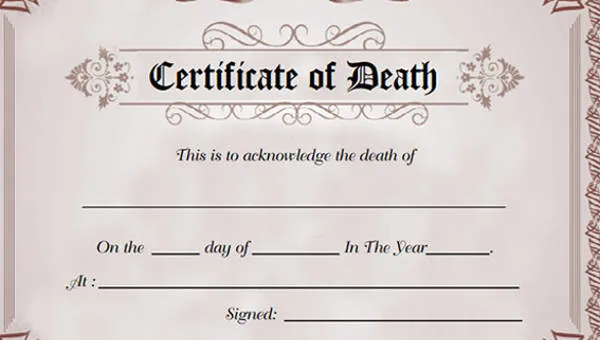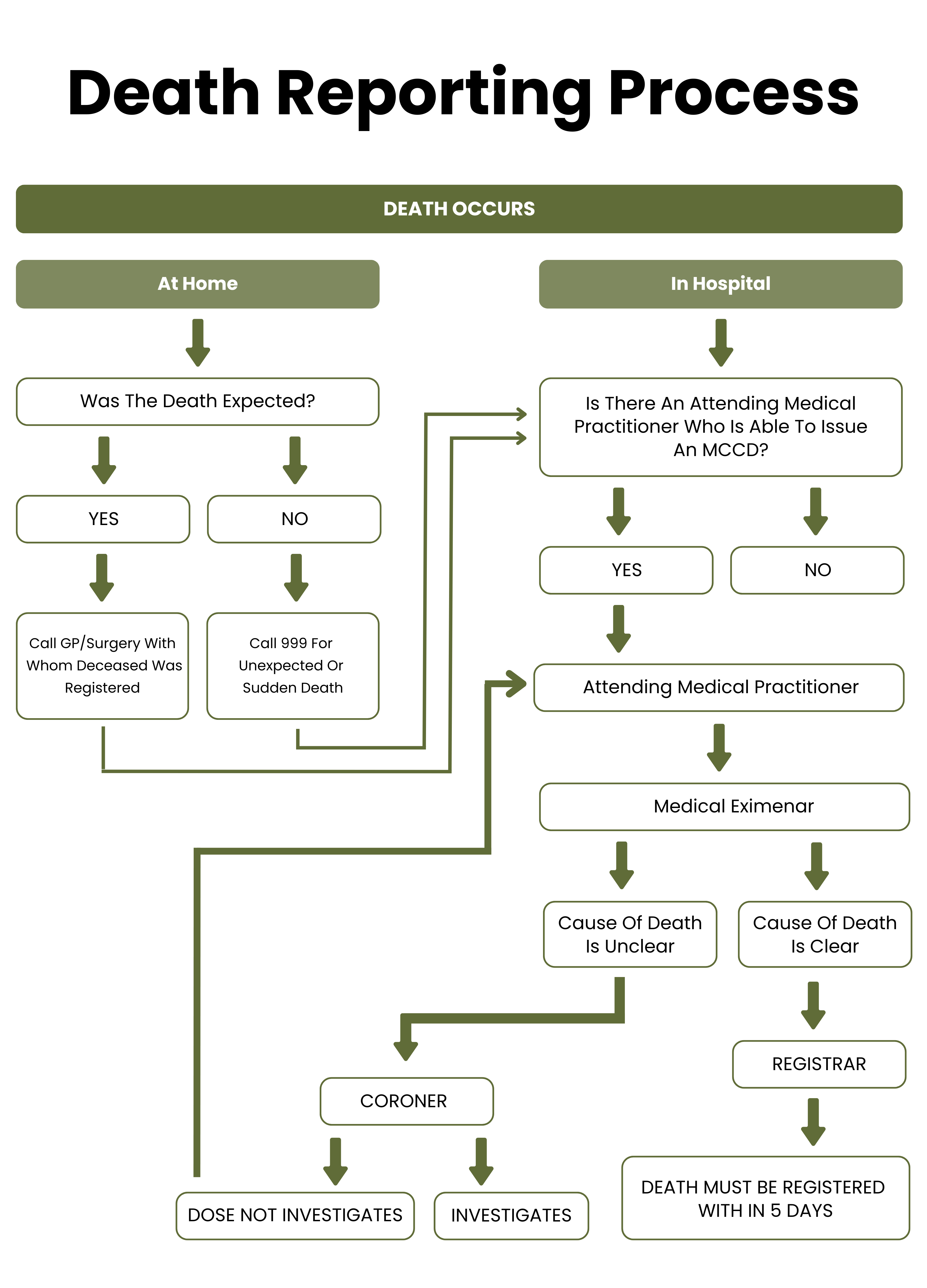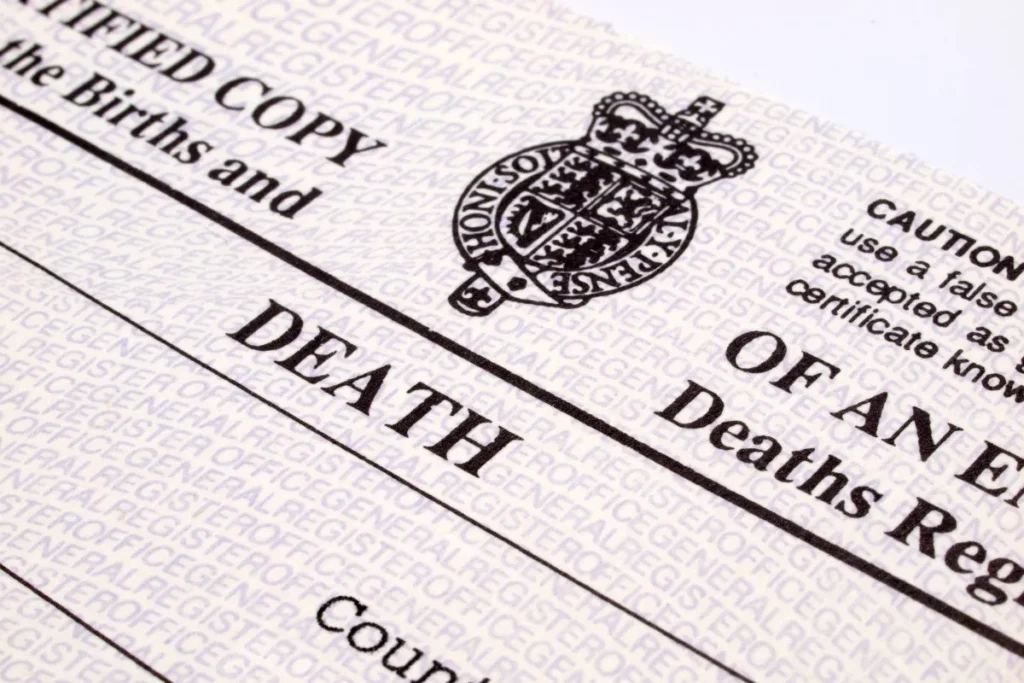After Death
The moments after losing a loved one can feel overwhelming, but having clear steps can help. This guide outlines practical tasks and provides essential tips to manage the process smoothly.
Immediate Actions
At the time of death, there may be religious rites to perform, such as reciting the Shahada. Seek guidance from an Imam or the hospital’s Muslim Chaplain.
- Ensure the hospital removes cannulas, tubes, and other medical devices.
- Remove false teeth, jewellery, and rings.
- Close the eyes and mouth. If needed, tie a bandage around the chin and head to keep the mouth closed.
- Straighten the arms and legs; some families tie the big toes together to maintain leg alignment.
- Please note that if the death is at home, the Police may attend even if the death is expected. This is standard practice so please do not be worried.
Please note that if the death is at home, the Police may attend even if the death is expected. This is standard practice so please do not be worried.
Documentation & Arrangements Overview
Quickly appoint a local Muslim funeral director—often through your mosque—as they can guide you through these steps.
- The GP/treating doctor will need to propose a medical cause of death to the Medical Examiner.
- Medical Examiner reviews medical notes in order to approve/agree the proposed cause. Once agreed, both the GP/treating doctor will need to sign the ‘MCCD’ form and email it to the Registrar.
- Make an appointment with the Registrar to obtain the Death Certificate and ‘green form’ authorising burial.
- Body Release
- Agree on the type of coffin with the funeral director.
- Arrange for the grave preparation at the cemetery, ensuring timelines align with prayer and burial requirements.
- Coordinate with the mosque for ghusl (ritual washing), Janaza (funeral prayers), and catering arrangements.
For Overseas Burial
- Engage a specialist funeral director for embalming and a zinc-lined coffin.
- Obtain a letter confirming the body is infection-free.
- Acquire an Out of England Certificate from the Coroner.
- Ensure all passports, visas, and required documents are prepared.
- Share coffin dimensions, (not forgetting to include the width of handles), with the receiving cemetery.
Medical Certificate Cause of Death
Attending Medical Practitioner (GP): This individual must have attended the deceased at any time during their lifetime. Complete MCCD including proposed cause of death. Sends MCCD to Medical Examiner with relevant medical records.
Medical Examiner: Carries out proportionate review of the MCCD and relevant medical records.
Coroner decides no duty to investigate: Coroner refers back for Attending Practitioner or ME to complete an MCCD and submit for Medical Examiner scrutiny. Coroner issues FORM CN1A. In exceptional circumstances, if no Attending Practitioner available, and cause of death is natural, the Coroner may ask the Medical Examiner to complete the MCCD. Coroner issues FORM CN1B.


Death Reporting Process
DEATH OCCURS


















Yes
Yes
DOES NOT INVESTIGATE
No
No
At Home
Was the death expected?
Call the Medical Practice (Surgery) with whom the deceased was registered
Call 999 FOR UNEXPECTED OR SUDDEN DEATH
CORONER
CAUSE OF DEATH IS UNCLEAR
INVESTIGATES
REGISTRAR
In Hospital
The hospital can usually issue a death certificate the following day.
ATTENDING MEDICAL PRACTITIONER
MEDICAL EXAMINER
CAUSE OF DEATH IS CLEAR
DEATH MUST BE REGISTERED WITHIN 5 DAYS
Role of the Medical Examiner
From 9th September 2024 it is a legal requirement that all deaths are scrutinised by a Medical Examiner (ME) before a Death Certificate can be issued. MEs are independent, senior doctors and they have 3 important aims:
- To look at the medical record and agree a cause of death (if possible) with the treating doctors and to check if notification to the Coroner is needed.
- To look for any signs that the care given to the deceased needs to be reviewed in more detail.
- To talk to the next of kin, explain the information on the Death Certificate and listen to any concerns they may have.

Role of the Coroner
Unlike the ME, the Coroner is not involved in every death.
The Coroner may become involved in cases where
- The cause of death is unclear.
- Death was sudden, violent, or unnatural.
- Death occurred in state detention (e.g. prison).
The Coroner can
- Issue an Out of England Certificate.
- Request a post-mortem.
- Open an investigation leading to an inquest hearing if necessary. If this happens, the Coroner will issue an ‘Interim Death Certificate’ allowing burial to proceed.
Role of the Registrar
The Registrar is responsible for registering the death and issuing the Death Certificate and ‘green form’ (burial consent).
Registration – When & Where
- Must occur within 5 days of the death.
- Register in the local authority area where the death occurred.
Who Can Register
A relative is the preferred person to register. If unavailable, others present at the time of death or those arranging the funeral may do so.
What You’ll Need
- Deceased’s full name, address, and occupation.
- Date and place of birth.
- Details of a surviving spouse or civil partner.
What You’ll Receive
- Death Certificate (£11 each; 3–5 copies are typically sufficient).
- Green Form (authorises burial).
- Form BD8 (for notifying benefits offices).
Post-Mortem Examinations
When a post-mortem becomes necessary to determine the cause of death, families can and should request less invasive methods, such as CT or MRI scans.. However, in some cases a full internal post-mortem will be unavoidable. It is ultimately the Coroner’s decision although the Coroner should liase with the family and explain the rationale.
Practical Tip Ensure all retained tissues or organs taken by the pathologist are reunited with the body before release, unless otherwise agreed.
Release of the Body
Where the GP/treating doctor has spoken with the Medical Examiner in advance and a provisional cause of death has been agreed, it may be possible for the body to be taken directly to the Mosque or funeral director’s mortuary (rather than the hospital mortuary).
Where the death is unexpected, it is likely that the body will be taken to the hospital mortuary. In some areas, once the ME has approved the medical cause of death, the hospital mortuary will release the body. In other areas, the hospital mortuary will insist upon seeing the Death Certificate from the Registrar.
In cases falling within the Coroner’s jurisdiction, it is only the Coroner that can release the body.
Please note that even if the body is ‘released’ burial cannot take place until the Death Certificate and ‘green form’ have been issued by the Registrar (or ‘Interim Death Cerificate’ issued by the Coroner). Travel overseas cannot happen without the Coroner’s ‘Out of England’ Certificate.
Ghusl (Ritual Washing)
The washing of the body, known as ghusl, follows Islamic guidelines
- Check if your mosque has appropriate facilities; if not, use a funeral home.
- Prepare essential items, such as gloves, clean towels, rose water, and shroud (kafan) cloth.
- Those performing ghusl must also shower and change before attending Janaza prayers.
Janaza (Funeral Prayers)
Janaza prayers can take place in the mosque or at the graveyard. Coordinate with your Imam regarding prayer practices, as these can vary.
Burial in the UK
- Notify the cemetery in advance to prepare the grave.
- Some cemeteries offer different grave types (e.g., brick-lined or vaulted).
- Burial can occur in a shroud without a coffin if permitted.
- Check if headstones or memorials are allowed, as some areas restrict these.
Burial Overseas
- Work with a funeral director to arrange embalming and a sealed coffin.
- Obtain all required documents, including the deceased’s passport and an Out of England Certificate.
- Share coffin dimensions with the receiving cemetery.
- Notify the airline and ensure the body is transported as cargo.
Practical Tip Confirm with the airline crew that the body is on board before departure.
Out-of-Hours Services
Access to services at weekends or public holidays varies. Coordinate with your funeral director to understand availability in your area.
Practical Tip Encourage community leaders and mosques to meet with local authorities to advocate for improved out-of-hours services, especially for faith deaths.
Dignity and Respect for your loved-one
By following these steps and seeking support from your mosque, funeral director, and community, you can ensure that your loved one’s final journey is carried out with dignity and respect.

We’re here to help
Take the first step today – start planning for peace of mind and support your loved ones when they need it most.
Any questions?
Remember – We’re here to help.